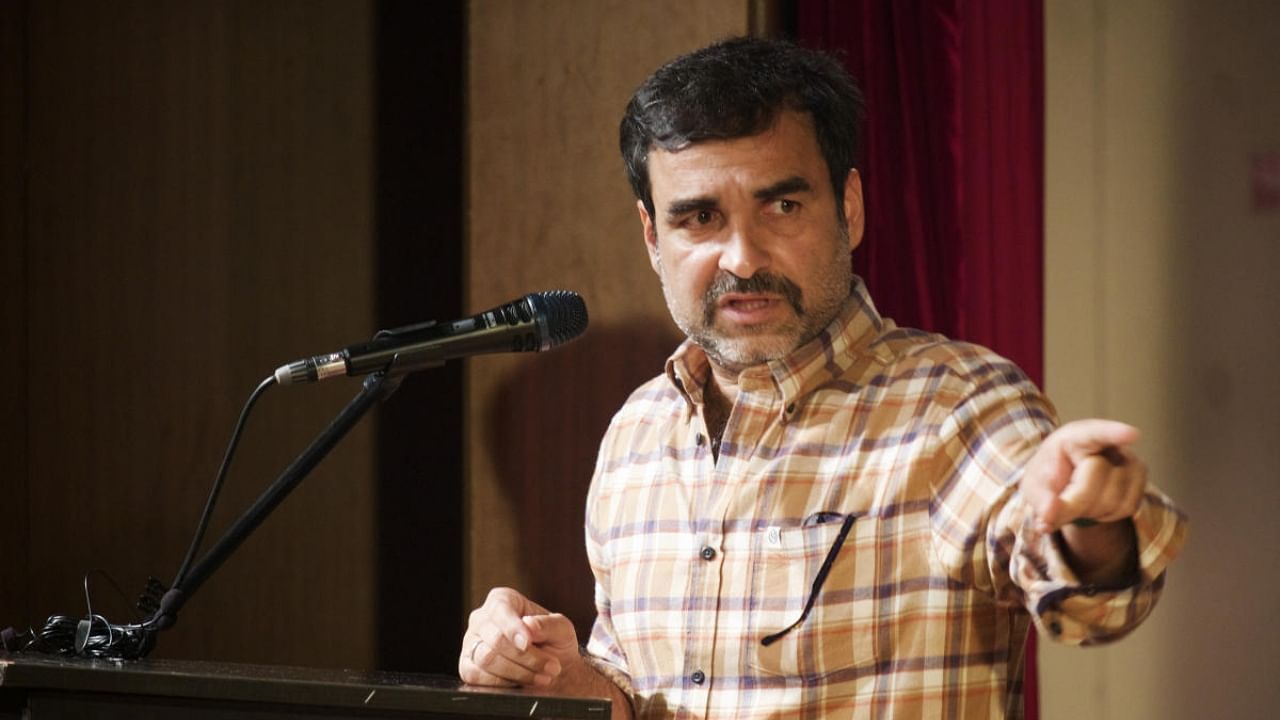
Are actors mere puppets controlled by directors? Should they be socially responsible? Why do film actors become celebrities and how can stage actors evolve? These were the questions that came up when eminent theatre personality Prasanna began a week-long actors’ workshop in Mysuru.
To answer these questions, I moderated a panel comprising Pankaj Tripathi, the popular Hindi film actor, Du Saraswathi, social activist, actor, writer and director, Janardhan (Janni) former director of Ranganayana, Lakshmana KP, stage director, and actor, Yatheesh N Kollegal, actor and director and Sripad Bhat, director and pioneer of rural theatre.
Here’s a gist of the discussion from the event ‘Actors on Acting’, organised by Acting Shastra, in association with Mysore District Amateur Artiste at the Kiru Rangamandira.
Sandhya Mendonca (SM): Film stars are idolised and every action of theirs is reported by a gushing media. Does this trivialise the actor as a thinking being?
Pankaj Tripathi: Commercial cinema will make actors into brands to ensure that the investors earn returns. Hence the Page 3 focus and the insistence that an actor stick to the same formula. For example, scriptwriters mention that I should give my ‘signature nod’ at a certain place. Commercial actors should view the popularity that they get through their roles as part of a game. If they mistake it for reality, they will find it difficult when their popularity dips and they have to come out of the fame bubble.
I began as a stage actor in Hindi theatre but it was difficult to survive in Patna and I moved to Mumbai in the hope of getting a break in films. I spent 12 years without even looking at a camera and now I am successful as nine of my films in a row became hits. My calendar is full for a whole year but I felt a crisis of confidence. I had a choice between embracing the privileges and lifestyle of a celebrity or evolving as an individual and actor. I needed clarity and I came here to meet my guru, Prasanna. I think an actor should continue to learn. Actors, especially in Hindi films, should enroll in refresher courses in theatre or film schools. I will start these soon with Prasanna in Mumbai.
SM: In theatre, the director and playwright command respect while the actor is treated like a lump of clay. Can this change?
Sripad Bhat: Acting was my first love but I became a director by default since there was no one in my village or taluk to direct plays. Around 75 % of directors in the state are dissatisfied actors who haven’t had the joy of acting.
The power structure in theatre places the director at the centre and actors on the fringe. Hence the actors don’t aspire to become thinking actors. They are content to rest their head on the director’s shoulders. Critics don’t talk about actors and a vocabulary for critiquing actors has not developed.
Lakshmana KP: We don’t know how to appreciate acting but neither should we glorify actors as an actor’s job is not more special than others. I am against the romanticisation of acting and actors.
Acting is a game, but the playfulness vanishes when the director sits like an authoritative zamindar. The directors think their imagination is better than the actors’. But it is the actor who is one with the audience.
Yateesh G Kollegal: Hitherto, the actor had a lower position as he was less informed than the director, and not well-read. I have embarked on my training venture ABCD to ensure that the actor is better read than the director.
SM: What is the role of actors in society? Is it a moral obligation to take up causes?
Du Saraswathi: I learnt from Badal Sircar the concept of 3rd theatre and it changed my life. I take theatre to where the people are and don’t expect people to come to where I am.
A woman’s body is a battlefield. It has become a stage for disrespect. All women must learn to act in theatre to shed their inhibitions. Badal Sircar’s workshop revealed that the body is an amazing space that can absorb emotion and project it on stage.
I perform intimate theatre and street plays with a purpose. I have directed plays and held performances with women who are HIV-positive, sex workers and garment factory workers. Theatre became the medium for them to express their suffering.
Janardhan (Janni): An actor should be socially responsible. As a social being, they should be a sensitive participant in the social structure.
When Tripathi met Puneeth
Pankaj Tripathi recalled Kannada star Puneeth Rajkumar praising him when they met in Mumbai a couple of years ago. Puneeth recollected Tripathi’s first appearance in a movie, the 2003 Kannada film ‘Chigurida Kanasu’ directed by TS Nagabharana and starring his brother Shivarajkumar. In the film, he played the hero Shivarajkumar’s (Shankar) friend in college.
(The writer is an author and cultural evangelist)